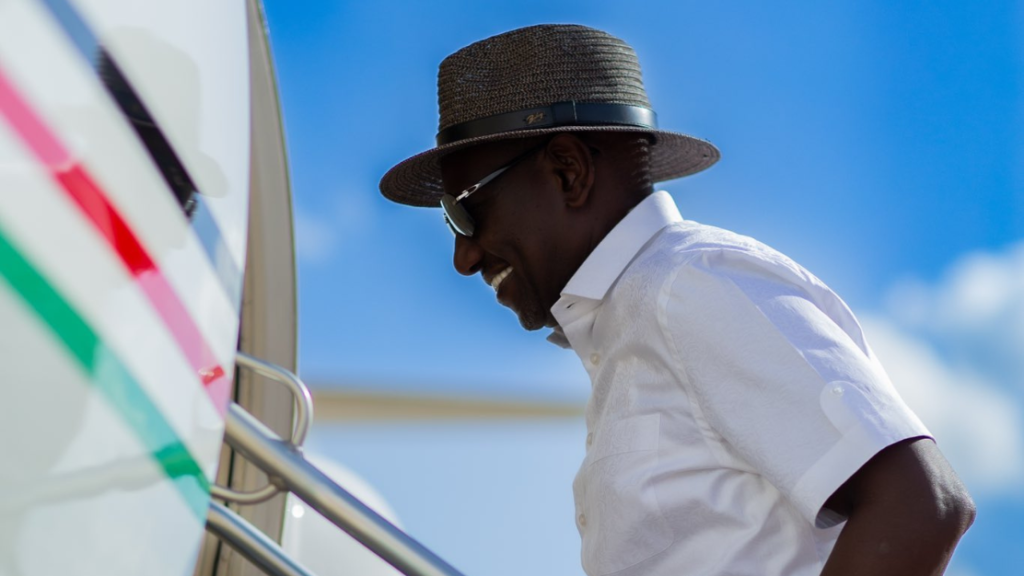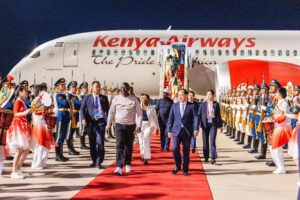President Ruto Travels to Rwanda for Kagame’s Inauguration
VICTOR KIPCHUMBA August 11, 2024 0
PHOTO: President Ruto boading a plane
President William Ruto embarked on an important diplomatic journey on Sunday. He left Kenya to attend the inauguration of Rwanda’s President Paul Kagame. This event will mark Kagame’s fourth term in office, reflecting his long-standing influence in Rwandan politics. Ruto will join numerous other African leaders in Kigali, making this a significant gathering of regional powers.
A Gathering of African Leaders
In Kigali, the capital of Rwanda, President Ruto will stand alongside other prominent Heads of State. These leaders have traveled from across Africa to witness Kagame’s swearing-in. Notable attendees include South Sudan’s President Salva Kiir, Guinea Bissau’s President Umaro Sissoco, Zimbabwe’s President Emmerson Mnangagwa, Senegal’s Prime Minister Ousmane Sonko, Gabon’s President Oligui Nguema, Ghana’s President Nana Akufo-Addo, the Central African Republic’s President Faustin-Archange Touadéra, and Togo’s President Faure Gnassingbé.
In total, 23 African leaders are expected to attend this momentous event. Kagame’s victory in Rwanda’s July 15, 2024, polls set the stage for this grand occasion. The National Election Commission declared him the winner with a staggering 99.15% of the vote, underscoring his dominant position in Rwandan politics. Kagame has served as the de facto leader of Rwanda since the end of the 1994 genocide, and he officially became president in 2000. His influence and power continue to shape the nation.
Ruto’s Return to International Diplomacy
President Ruto’s trip to Rwanda marks his return to international diplomacy after a two-month hiatus. During this period, Ruto focused on domestic issues, rarely leaving Kenya. His last international engagement was the inaugural Korea-Africa summit on June 4, 2024. However, following that event, he remained in Kenya, dealing with pressing challenges at home.
Kenya has faced significant unrest in recent months. Youth-led protests erupted on June 18, 2024, and have continued to destabilize the Kenya Kwanza government. These protests began as a call to abandon the controversial Finance Bill 2024, but they quickly escalated into a broader movement demanding political and economic changes. The intensity of the protests forced President Ruto to take drastic actions.
A Domestic Crisis Sparks Major Changes
In response to the protests, President Ruto made sweeping changes within his government. He dismissed his entire Cabinet and signaled a desire to start afresh. Ruto also implemented several austerity measures aimed at stabilizing the country’s finances. These measures, he announced, would help Kenya live within its means and address the economic challenges that have fueled discontent among the population.
The decision to dismiss his Cabinet and introduce austerity measures reflects the gravity of the situation in Kenya. Ruto recognized the need for decisive action to quell the unrest and restore stability. However, the protests have not yet subsided, and the country remains in a state of uncertainty.
The Significance of Kagame’s Inauguration
President Kagame’s inauguration holds great significance not only for Rwanda but also for the entire African continent. Kagame’s leadership has been marked by both praise and criticism. His supporters credit him with transforming Rwanda into a stable and prosperous nation after the devastating genocide of 1994. They point to the country’s economic growth, improved infrastructure, and social progress as evidence of his effective governance.
However, Kagame’s critics argue that his long tenure in power has come at the cost of political freedoms and human rights. They accuse his government of suppressing dissent, limiting press freedom, and stifling opposition. Despite these criticisms, Kagame’s grip on power remains unshaken, as evidenced by his overwhelming victory in the recent elections.
A Diplomatic Balancing Act
For President Ruto, attending Kagame’s inauguration presents both opportunities and challenges. On the one hand, it allows Ruto to strengthen diplomatic ties with Rwanda, a key regional player. Rwanda’s strategic location and growing influence make it an important ally for Kenya. By attending the inauguration, Ruto can reinforce the relationship between the two countries and explore opportunities for cooperation in areas such as trade, security, and regional integration.
On the other hand, Ruto must navigate the complex dynamics of African politics. Kagame’s leadership style and his long tenure in power have sparked debates across the continent. Some African leaders admire Kagame’s achievements and see him as a model of effective governance. Others, however, view his leadership with skepticism, concerned about the erosion of democratic principles in Rwanda. Ruto’s presence at the inauguration will be closely watched, and his interactions with other African leaders could have implications for Kenya’s diplomatic standing.
The Road Ahead for Kenya
As President Ruto attends Kagame’s inauguration, he leaves behind a country grappling with significant challenges. The ongoing protests in Kenya reflect deep-seated frustrations among the population, particularly the youth. The economic hardships exacerbated by the Finance Bill 2024 have fueled anger and discontent. The government’s response, including the dismissal of the Cabinet and the introduction of austerity measures, has yet to quell the unrest.
Ruto’s ability to navigate these challenges will be crucial for his presidency. While his attendance at Kagame’s inauguration signals a return to international diplomacy, Ruto must also address the domestic issues that threaten to destabilize his government. The protests have highlighted the need for political and economic reforms, and Ruto will need to find ways to address the concerns of the Kenyan people.
President Ruto’s trip to Rwanda for President Kagame’s inauguration marks a significant moment in African diplomacy. The gathering of African leaders in Kigali underscores the importance of Kagame’s leadership and the impact of his long tenure in power. For Ruto, this trip presents an opportunity to strengthen diplomatic ties with Rwanda while also navigating the complex dynamics of African politics. However, as Ruto engages in international diplomacy, he must also address the pressing domestic challenges that continue to shape Kenya’s political landscape. The road ahead is uncertain, but Ruto’s actions in the coming months will determine the future of his presidency and the stability of Kenya.




